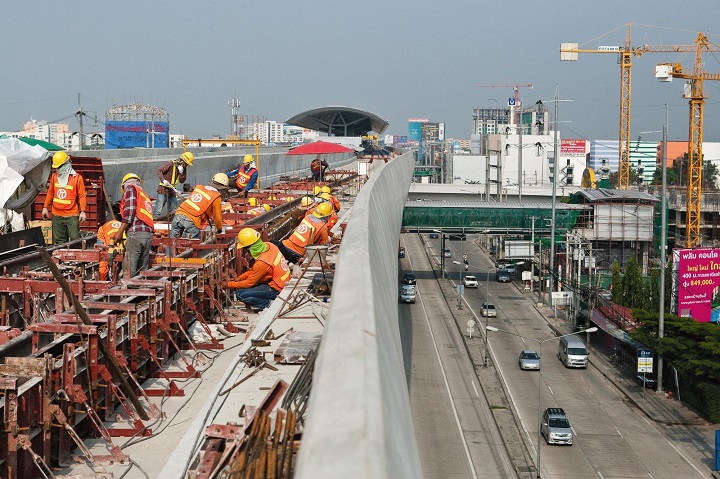Monthly Highlights of Research Activities: What Are the Effects of Infrastructure Development in Developing Countries?
2024.12.25

(Photo: JICA/Shinichi Kuno)
The development of infrastructure such as transport, water, sewage, electricity, and telecommunications is essential for the growth of countries and cities, as well as for improving people's lives. Infrastructure development is one of the main areas of Japan's development cooperation in developing countries.
JICA Ogata Research Institute analyzes the social and economic effects of infrastructure development, using a range of data on infrastructure projects implemented by JICA. The institute also studies the factors and methods that enable sustainable infrastructure development in developing countries, taking into account financial and environmental costs. Here are some of its activities and research findings.
This blog post was written by Endo Kei , who is participating in research projects on infrastructure development. Based on his hands-on experience and research, he provides an overview of Japan’s cooperation with developing countries to develop infrastructure, along with some new trends in recent years. He also shares some next-step research topics.
Ashida Hana , research officer, wrote this blog post to discuss how a project to improve provincial roads in Morocco has impacted the economic activities of the people and youth education and employment, based on an impact evaluation of this project.
As a longstanding contributor to infrastructure development in developing countries, Japan has advocated for the importance of quality infrastructure investment. At this Knowledge Forum, experts introduced cases of JICA’s urban transportation infrastructure projects and discussed various aspects of Japan’s unique contributions as well as the future prospects in this field.
Cooperation on socioeconomic infrastructure development in Asia has been the core of Japan's official development assistance (ODA) from the era of post-war reparations and quasi-reparations—the origin of Japanese ODA—to the present. This book looks back at the philosophy and history behind that assistance, while comparing it with assistance by Western and emerging donors, to examine the conditions under which Japan's assistance can stand out today.
JICA has published the first comic book of “Project History ” series titled “Madam, This is Our Metro!—India and Japan Committed to a Better World & Future” on the JICA website. Through this comic, JICA aims to arouse the interest of the younger generation regarding developing countries and the challenges faced by the world. The book is a heartwarming story about the activities of the author, Abe Reiko, who aspired to work as a civil engineer, which is viewed as a male-dominated occupation in Japan, and struggled at a metro construction site in India.
This paper analyzes the effects of the Delhi Metro on the work participation rate of women and men, using a three-period (1991, 2001, and 2011) panel data of township-level zones within the city of Delhi.
Through a literature review and analysis of infrastructure development projects in developing countries, this project examines the success factors and development assistance strategies for sustainable infrastructure development using development finance such as ODA and Public Private Partnerships (PPP).
The benefits of irrigation infrastructure include rising incomes and the accumulation of social capital, including a general trust of beneficiaries. However, various issues such as environmental impacts have been pointed out, for example, land salinization. This study examines the contribution of irrigation infrastructure aid to poverty reduction and sustainable development in Sri Lanka through a quasi-experimental analysis of long-term household microdata.
This research estimates infrastructure demands in Asia, including social infrastructure such as education and health, infrastructure for disaster risk reduction, and urban/high-speed railway infrastructure. It also makes policy recommendations to fulfill the gap between the demands for and current levels of infrastructure investment finance.
This study analyzes the economic and social impacts of Japan's infrastructure development at the national and regional levels in Japan using econometric methods, and reviews the contours and impacts of related development and fiscal policies. It extracts suggestions for sustainable infrastructure development in developing countries.
Upon the completion of construction and the start of operations for JICA-funded large-scale infrastructure projects, this project conducts rigorous assessments of their development impact, seeking to improve our practical knowledge for the implementation of quality infrastructure investment.

事業事前評価表(地球規模課題対応国際科学技術協力(SATREPS)).国際協力機構 地球環境部 . 防災第一チーム. 1.案件名.国 名: フィリピン共和国.

事業事前評価表(地球規模課題対応国際科学技術協力(SATREPS)).国際協力機構 地球環境部 . 防災第一チーム. 1.案件名.国 名: フィリピン共和国.

事業事前評価表(地球規模課題対応国際科学技術協力(SATREPS)).国際協力機構 地球環境部 . 防災第一チーム. 1.案件名.国 名: フィリピン共和国.

事業事前評価表(地球規模課題対応国際科学技術協力(SATREPS)).国際協力機構 地球環境部 . 防災第一チーム. 1.案件名.国 名: フィリピン共和国.

事業事前評価表(地球規模課題対応国際科学技術協力(SATREPS)).国際協力機構 地球環境部 . 防災第一チーム. 1.案件名.国 名: フィリピン共和国.
scroll